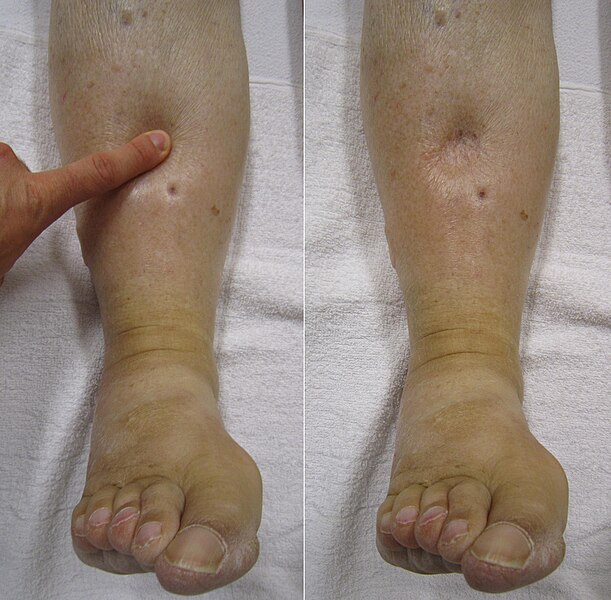Question of the week 5-13: Edema
Written by Jeffrey Davis on May 16, 2011, 10:56 p.m.
From Safia Gadelkarim Lyon: "My 93yr old grandfather-in-law has had extensive swelling in his hands and feet. After going to the doctor, he was told it was from eating too much salt. He admits he's eating salted popcorn 3 to 4 times a day. Can salt really cause that much swelling? I can press my finger on his hand and leave an indention for at least 45 to 60 seconds. Is there potentially something else happening?"
Let first talk about the symptoms that your grandfather-in-law is having, principally the swelling in his hands. We call this "edema" and it happens when there is a shift of fluid into the interstitial space.

This shift causes an increase in interstitial fluid, the fluid that bathes the cells of multicellular organisms. In this fluid is many things our cells need for survival: amino acids, sugars, fatty acids, coenzymes, hormones, neurotransmitters, salts, as well as waste products from the cells.
There are two main ways that edema forms. The first is by altering the hydrostatic forces between the capilary and the interstitial space such that movement into that space is favored. The second way is retention of dietary or IV administered sodium. What we know about sodium in the body is that water always follows it. Normally the kidneys carefully balance the salt content in the body through complex mechanisms. A third contributing factor to edema and this is the lymphatic system. If the lymphatics system is overwhelmed the net effect is retention of fluid in the interstitium.
Now lets talk about some specific causes of edema...
Mild causes:
- Sitting or staying in one position for too long
- Eating too much salty food
- Premenstrual signs and symptoms
- Pregnancy, which can cause swelling in your hands, feet and face from excess fluid retention
More serious causes:
- Heart failure: with this condition the heart is no longer efficient at moving blood around the body and pressure builds up in the tissue such that interstitial space receives more water and causes edema. The body tries to compensate by retaining more fluid (specifically with the kidneys holding onto more sodium). Remember, water follows sodium.
- Drug induced edema: Many drugs can alter the kidney's ability to regulate sodium and thereby alter the interstitial fluid volume. Certain antihypertensives called calcium channel blockers, NSAIDs (like ibuprofen), antiparkinsons medications, estrogens and even some diabetic medications can all be implicated.
- Cirrhosis of the liver: a disease causes scarring of your liver, which interferes with liver function, causing changes in the hormones and chemicals that regulate fluids in your body
- Kidney disease or damage: the kidneys have impaired ability to eliminate fluid and sodium from your blood. That extra sodium can increase pressure in the blood vessels and cause edema.
- Weakness in the valves of veins: in this condition the veins ability to carry blood back to the heart causes fluid to leak back into the tissue.
- Damaged lymphatics: either due to cancer or infection
 So getting back to your grandfather-in-law... there are a few things I would ask about before blaming excess salt intake (although asking him to reduce salt intake would be wise).
So getting back to your grandfather-in-law... there are a few things I would ask about before blaming excess salt intake (although asking him to reduce salt intake would be wise).
- Is there a disease that could be causing this (cardiac disease, alcoholism or liver damage, hypertension)?
- Could a prescription drug be causing this?
- Is there any evidence of edema in the lungs (pulmonary edema, a common condition in heart failure)
- What is the pattern of edema? Is it only in the hands? Both hands equally? Is there edema in other areas such as the legs or sacrum?
In conclusion, while excess salt intake could be the cause of edema it may also be caused by some serious disease states that can be ruled out with further testing and blood work.